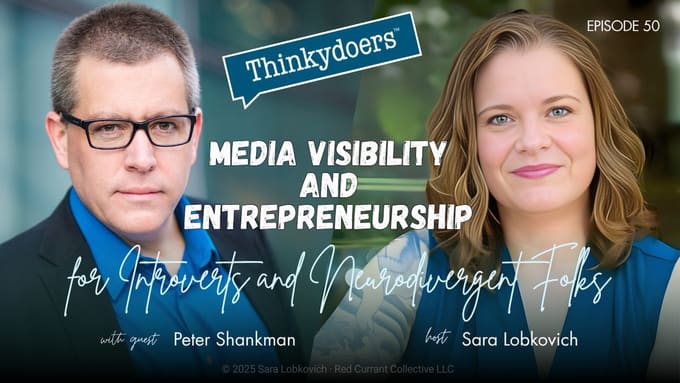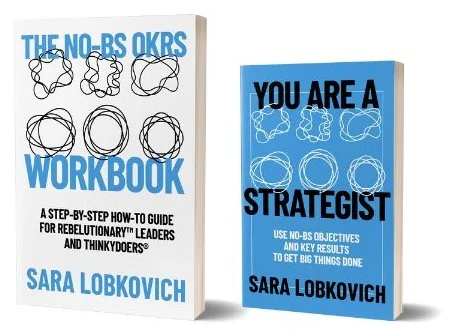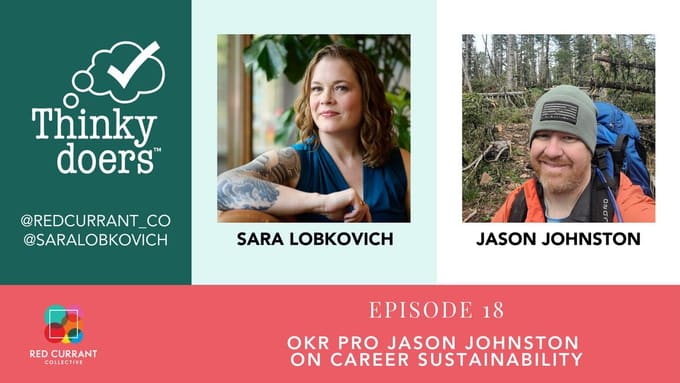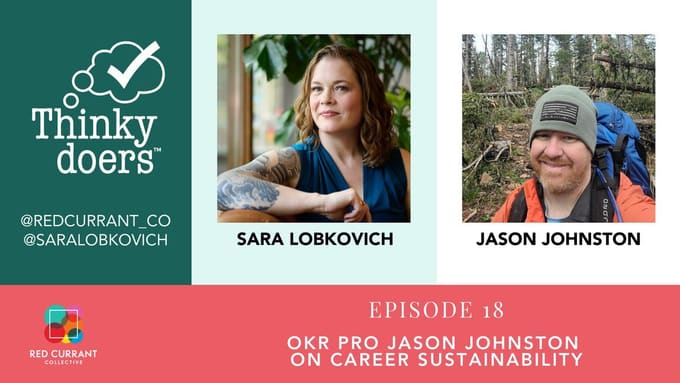Media Visibility and Entrepreneurship for Introverts and Neurodivergent Folks

With Guest, Peter Shankman
What if your different wiring isn’t something to overcome—it’s the foundation for building a business that actually works for you?
For years, many neurodivergent professionals have spent enormous energy trying to decode unspoken workplace expectations, masking their natural tendencies, and wondering why traditional employment feels so exhausting. But what happens when we embrace the brains we’ve got instead of trying to mind-read what’s expected of us, and start building businesses that work WITH our wiring instead of against it?
In this milestone 50th episode of Thinkydoers, Sara sits down with serial entrepreneur Peter Shankman—creator of five startups with three exits, founder of Help a Reporter Out (now Source of Sources), and co-founder of Mental Capital Consulting. Peter shares his journey from spending decades believing something was wrong with him to building multiple successful companies powered by his ADHD brain.
Whether you’re a shy introvert wondering how to gain visibility, a neurodivergent professional considering entrepreneurship, or a leader trying to understand how to build truly neuroinclusive workplaces, this conversation will challenge everything you thought you knew about “fitting in.”
Episode Highlights:
-
How accidentally falling into PR and media led Peter to discover that the only way he could truly thrive was by making his own rules.
-
Why decades of being told you’re “disruptive” can feel like a burden—and how unlearning that narrative helped Peter see his neurodivergent brain as an asset, not a liability.
-
Media visibility for introverts: why letting press coverage do the talking can be a game-changer when self-promotion feels impossible.
-
What every company should understand about neurodiversity—and why resistance to change is holding workplaces back.
-
Don’t hide your different brain: Peter’s powerful message about embracing neurodiversity without shame—it doesn’t have to define your whole identity, but it shouldn’t be your secret either.
Key Concepts Explored:
-
Accidental career in PR and media: How starting out in an AOL chatroom led Peter to discover that he thrives when he creates his own rules.
-
Entrepreneurship as a fit for neurodivergent brains: Why traditional employment can feel restrictive and self-employment allows your wiring to become an asset.
-
The “broken” narrative: Unlearning decades of being told you’re disruptive and embracing neurodivergence as a benefit rather than a liability.
-
Media visibility for introverts: How earned media and press coverage can do the talking for you when self-promotion feels impossible.
-
Building neuroinclusive workplaces: Why companies resist change and what they can gain by embracing employees who think differently.
-
Don’t hide your different brain: Embracing neurodiversity without shame—it doesn’t have to be your entire identity, but it shouldn’t be your secret either.
-
Creating your own sandbox: Designing your environment and work to meet your unique strengths and needs.
Common Questions Answered:
-
How can I turn neurodivergence into an asset in my career or business?
-
Why do traditional workplaces often feel limiting or frustrating for neurodivergent people?
-
How can media visibility help introverts or high-expertise thinkers get noticed without self-promotion?
-
What does it take to create a neuroinclusive workplace that supports different ways of thinking?
-
How do I embrace my “different brain” without shame or feeling like it defines me?
Notable Quotes:
“If you didn’t know what to do, fake it and figure it out” – Peter Shankman [00:04:00]
“The majority of us have been told our whole lives that we’re broken. It took me 20 years to realize I could make my brain work for me.” – Peter Shankman [00:06:00]
“Media visibility does the talking for you. You don’t have to say you’re great—let the world see it through others.” – Peter Shankman [00:07:00]
“Companies don’t realize the benefit of allowing people who think differently to lead—they resist change, but that’s where growth happens.” – Peter Shankman [00:08:00]
“Don’t hide your different brain. You don’t have to make it the centerpiece of everything you do, but don’t hide it either.” – Peter Shankman [00:11:00]
“You can embrace your gifts and think differently, and that alone can make your life and work richer.” – Peter Shankman [00:11:00]
Chapters:
[00:00:00] Introduction: Celebrating the 50th episode and welcome to Peter Shankman
[00:01:00] Guest Introduction: Peter’s background as a five-time entrepreneur, author, and co-founder of Mental Capital Consulting
[00:03:00] Early Career: How AOL and accidental opportunities shaped Peter’s path
[00:04:00] Entrepreneurship Journey: Discovering he could only thrive by making his own rules
[00:05:00] Neurodivergence as an Asset: Turning ADHD and different wiring into a career advantage
[00:07:00] Media Visibility for Introverts: How press coverage can do the talking for you
[00:08:00] Building Neuroinclusive Workplaces: What companies should know about embracing different thinkers
[00:09:00] Overcoming Resistance: Helping leaders accept neurodiverse approaches and change
[00:11:00] Don’t Hide Your Different Brain: Embracing neurodiversity without shame
[00:12:00] Connect with Peter: Where to find him online, including shankman.com, Instagram, Threads, and Faster Than Normal podcast
Guest Information:
Peter Shankman is a five-time entrepreneur, author, and founder of multiple companies, including HARO (Help A Reporter Out) and Source of Sources (SOS), platforms that connect journalists with sources worldwide. He is also the co-founder of Mental Capital Consulting, helping companies attract, hire, and retain neurodivergent employees while creating neuroinclusive workplaces.
Peter has delivered thousands of keynotes on customer experience, entrepreneurship, and neurodiversity. Known for his practical advice and “sandbox” approach, he empowers entrepreneurs, introverts, and strategically wired thinkers to embrace their unique strengths, gain visibility through media, and design careers and workplaces that fit their brains.
He is also the host of the podcast Faster Than Normal , where he explores how ADHD and other different wiring can be harnessed as an advantage in life and business.
Connect with Peter:
Websites: shankman.com, sourceofsources.com, helpareporter.com
Podcast: Faster Than Normal – fasterthannormal.com
Social: @petershankman on Instagram and Threads
Email: peter@shankman.com
Sara’s Links and Resources:
-
Pick up Sara’s book, “You Are a Strategist”findrc.co/td_yaas
-
Join Sara’s Email Newsletter: findrc.co/newsletter
-
Contact Sara: saralobkovich.com/contact
-
Sara’s website: saralobkovich.com
-
Thinkydoers Homepage: saralobkovich.com/thinkydoers-pod
Find full show notes and the episode transcript via https://findrc.co/thinkydoers.
Full Episode Transcript:
Sara: Welcome to Thinkydoers. I’m Sara Lobkovich, strategy facilitator and OKR coach, and I’m here for the strategic thinkers, the behind-the-scenes force multipliers, and anyone who’s ever felt like a square peg in traditional business culture. If you’re wired for change but struggle with organizational friction, moving goalposts, or feeling like you’re speaking a different language than your leaders and colleagues, this show is for you. Here, we explore how to move from insight to impact turning your strategic vision into undeniable outcomes that actually matter.
Today I have for you a short, as our 50th episode. I’m. celebrating with Peter Shankman — five-time entrepreneur, author, and co-founder of Mental Capital Consulting. Peter didn’t realize his ADHD was an asset for him until he became a founder. Now he’s helping [00:01:00] companies build neuroinclusive workplaces.
If you’ve ever been told you are too much or wondered whether entrepreneurship might be the path because traditional employment just doesn’t fit you, this conversation is for you. It’s also for you if you’re a high-expertise introvert. Media, and earned media, and being a media source, are some of the ways that us high-expertise introverts can help get our message and expertise out into the world. And that’s also part of Peter’s background. And while I don’t get the impression that Peter himself is an introvert, he does have quite a bit of insight into media and how that works.
You’ll learn a little bit about SOS, his project that helps match reporters and sources, and I’ll include those links in the show notes.
Sara: So, Peter, I’m really delighted to meet you and to have you on the podcast. For folks who don’t know who you are, tell us who you are, what you do, and why you were interested in [00:02:00] speaking to Thinkydoers.
Peter: So My name is Peter Shankman. I am a born and raised New York City kid, still living here after 53 years. I am an entrepreneur with five startups and three exits under my belt. So I’m currently running two companies. Most notably, I created a company that connected journalists with sources around the world. I sold that countless years ago, and then when I heard it wasn’t doing that great, I rebuilt it under a new name. I currently run it as sourceofsources.com, a very easy, simple free newsletter that goes out twice a day. You get queries from journalists all over the world, and if you can answer them, you reply directly to the journalists and you get quoted in media all over the world. I co-founded Mental Capital Consulting, which is a company that helps companies attract, ,hire, and retain neurodivergent employees while helping to make their companies more neuroinclusive. I’ve written several books on both customer experience and neurodiversity. I’m talking ahead on most of the networks of a corporate keynote speaker with a couple of thousand speeches in my belt, and I’m a single dad to a 12-year-old girl, which is just more fun than anything else.[00:03:00]
Sara: Yeah, I’ve been a Peter follower since the beginning of the first project way back on the bird site place. what I’m most curious to have you talk about with my folks, who are not all neurodivergent, but we’ve got a lot of neurodivergent folks, lots of introverts here, people who are strategically wired. So we tend to be the quiet ones in the background. Your projects help folks like us get out there or find ways to put ourselves out there. How did you wind up focused on PR and media awareness?
Peter: I started my career having no idea what I wanna do with my life. I was hanging out in an America Online chat room back in the nineties when AOL was the internet. Someone in the chat room said, “My company’s trying to build a newsroom. Send me a resume.” Like, sure, I’m fresh outta school, I have absolutely no experience of living in my parents’ basement. This will be great. I learned that sarcasm does not translate well on the internet. And I was hired two weeks later as one of the founding editors of the America Online newsroom. I moved down to Virginia and helped [00:04:00] launch a newsroom with no experience whatsoever. We built “Welcome, you’ve got mail” in today’s, the little newspaper icon in Today’s News, we built that. And it was an incredible experience. I learned very quickly that if you didn’t know what to do, fake it and figure it out. And that was awesome. I figured every job was like that. I left AOL three years later, and I was wrong. Every job was pretty boring and kind of like, “Hey, do your work,” and you have an 8:00 a.m. meeting, an 8:30 meeting, 9:15 meeting, 10:15 meeting. And my ADHD, which I didn’t know I had at the time, I knew that a was a great place to work. I didn’t realize why it was off the charts and my next job because they had us come in every five seconds and I’m like, oh “Oh my God, this is Russia and this is terrible.” I lasted a week and I realized, okay, apparently the only way I had to work is either at AOL or by myself. And so I started, with no experience, a PR and marketing firm that I figured would cater to the dotcom set since I had AOL experience, and I built it. In three years we had the darlings of dotcom, clients, Napster, Juno, things like that. Sold it to a larger agency in 2001, and that was the first of many. I realized that I [00:05:00] play well with others when I can make the game, and we wound up just doing a lot of fun and having a lot of every company I’ve done has been a lot of fun. The goal is to have a blast with it, to enjoy it first and then figure out what to do and how to make money second, and that’s sort of how it’s been.
Sara: I love that you talk about entrepreneurship the way you do. I get as many questions about being self-employed as I do about the substance of my work from other people who are neurodivergent. I’d just love to hear a little bit more about your entrepreneurship journey with your wiring.
Peter: I think that started to change. I think we are starting to see CEOs and founders and startup entrepreneurs lean into that a little bit and say, “Hey, yeah, my brain does work differently, but here’s how it benefits me.” I’ve given a ton of talks. And listen at a ton of conferences where people say, “Yeah, I am neurodivergent,” and it wasn’t until I became an entrepreneur or CEO that I realized there were benefits to it. You gotta realize the majority of us, especially in my mind, my timeframe, and my age group, have been told our whole lives that were broken and [00:06:00] have been told that, you know, “sit down, you’re disrupting the class.” I mean, my mantra in junior high was, “sit down, you’re disrupting the class.” And it took about 20 years after high school to get diagnosed and to realize, “Hey, I can make this my superpower,” or not even superpower, “I can make this my benefit.” And when I finally realized that it took a lot of undoing. I’ve been in therapy for 25 years, took a lot of therapy to get over the fact that I constantly felt broken. I’ll have great days and I’ll still believe that. It’s just luck. It’s a constant battle, constant struggle to get that done, but over time you do. And you know, over time you realize that, “Hey, maybe I’m doing something cool here. Maybe this is worth it.” It takes time.
Sara: And some of us have to make our own sandboxes to do it. My last guest, we got into the conversation of being strategic isn’t necessarily an asset as an employee. It can be in the right job, but it can also be something that makes it even harder to be an employee. Let’s talk about the role that media visibility can play [00:07:00] for folks like me who really struggle to put themselves out there, the folks who are more shy, more introverted. What do you think the role is of media visibility in a shy entrepreneur’s toolkit?
Peter: The nice thing about media visibility is that it does the talking for you. Being able to showcase, to not have to say anything about yourself, but rather, look at this article, look at me on tv, look at this thing that I’m listing linking on my website to this, to this 30-second clip or whatever. It’s does the talking for you. It tells the world that someone other than yourself has already thought you were great, and someone than yourself thinking you’re great is a benefit because no one believes how good you are if you’re the one who’s forced to tell them. But if everyone else, other people tell you, you know, “Oh, that person’s amazing, you should go talk to him,” you’re gonna believe that it comes from a trusted source. So, you know, media availability plays a great role in that because it allows you to be that person that everyone wants to know, everyone wants to talk to, without you having to talk about it to say, “Hey, look, I’m perfect,” and lets other people do that homework for you.
Sara: You mentioned in the intro you work with companies that need a better [00:08:00] understanding of neurodiversity in the workplace. What do you wish that more companies knew about cognitively diverse workplaces?
Peter: I think it comes down to the fact that companies are afraid of change. That’s the way we’ve always done it before; that’s what we’ll continue to always do it.” Companies don’t realize that there’s tremendous benefit in accepting change and embracing change and realizing that the people who can lead your company into some of the best times are people who think a little differently. If you think the way you’ve always thought, you’ll get the results you’ve always had. Being able to think about new ways and new ideas and ways to run your company and ways to grow that you haven’t thought of before, that you’ve been afraid to think of before, tends to bring great results. And people who are neurodiverse tend to think differently by default. So allow that in and allow your company to embrace that. You’ll find an amazing experience waiting for you both financially and, from a work standpoint, from a corporate culture standpoint in all aspects.
Sara: Do you run into leaders who are resistant to the [00:09:00] dissent? And when you do, how do you work with them?
Peter: All the time. You’re gonna get people who are afraid of change, and you have to help them understand that if their goal is to generate revenue and to grow and to increase profits and to grow their business and to take over new divisions and sectors in places that they haven’t been before, they’re gonna have to do things they haven’t done before. And a lot of the resistance we get is that they have never seen it done before. They don’t realize that it’s been done in other ways. And so helping them understand that and saying, “Hey, look, here’s the benefits, here’s the people that can help you do that,” showing the results from other companies that tends to work. Showing them results from other companies tends to make them very happy.
Sara: Awesome. Well, I know you’ve got a sick kid that you need to go pick up. So, where can people find you if they wanna learn more about your work?
Peter: Yeah. I mean, my entire life is at shankman.com. I’m @petershankman on all the socials except Twitter. I don’t use that anymore, but you can find me at Peter Shankman everywhere else — Instagram, Threads, even Peloton. So if you wanna catch an early 5:00 a.m. ADHD-fueled ride with me one morning, feel free to follow me on Peloton. I answer my [00:10:00] own email, peter@shankman.com. I’m not allowed to run my own calendar; my assistant takes that away from me. But I’m allowed to answer all my own email, so I encourage you to reach out. I love, I love talking to people.
Sara: Your podcast is great too.
Is there anything that I didn’t ask you that you’d like to riff on?
Peter: I just think that people need to understand that neurodiversity, if you are neurodiverse and you’re coming out and saying you’re neurodiverse, sharing that cannot be the center of your life. It doesn’t have to be that which you start off every introduction with. But on the flip side, don’t be shamed by it either. You have a brilliant brain. No matter what your brain is like, it’s simply a way to grow it and benefit from it. Don’t hide it. You don’t have to make it the centerpiece of everything you do. But don’t hide it. Don’t hide behind it. Don’t be afraid to embrace the fact that you’re different and embrace the fact that you have these gifts that not everyone has.
Sara: You’re speaking to me. The pandemic made it impossible for me to mask my neurodivergence.
Peter: But you’re sitting here hosting a podcast, so congratulations. You’re doing really well.
Sara: Thank you. Yeah, putting the pieces together, I made my own sandbox, and I put together the environment and ways [00:11:00] to meet my support needs with what I can do in my own business. I’m about to do a really big talk about being neurodivergent, so it’s gonna be out there, but it still feels like a risk with working with other CEOs. And I just remind myself that a good number of them are also neurodivergent, whether they know it or not. So it shouldn’t be a disadvantage in our work with leaders.
Peter: Amen.
Sara: All right, Peter. Well, it’s great to meet you. Thank you for coming on.
Peter: No, I’d love to come back on when I’m not rushing out the door to pick up a sick kid.
Sara: Not at all. Girl dad comes first. Thank you, Peter.
Sara: All right, friends. That’s it for today’s 50th episode of Thinkydoers. You can find Peter at shankman.com, @petershankman on Instagram and Threads, and his podcast Faster Than Normal. He answers his own email at peter@shankman.com.
You can find at saralobkovich.com or on any social media platform — I’m pretty much anywhere @saralobkovich.[00:12:00] Please subscribe to Thinkydoers wherever you listen to podcasts, leave us a review, and share this 50th episode with your connections. Thank you for being here. These conversations matter, and they reach more people when you help spread and amplify them.
Until next time.

Podcast artwork for Episode 50 of Thinkydoers featuring Peter Shankman and host Sara Lobkovich, titled “Media Visibility and Entrepreneurship for Introverts and Neurodivergent Folks.”

You Are a Strategist: Use No-BS OKRs to Get Big Things Done
The practical guide to setting direction, making real progress, and clarifying priorities you and your collaborators can trust.
Get the BookReady to Implement OKRs?
Self-schedule a 25-minute Q&A to see if we're the right match. You'll walk away with answers to your questions and actionable insights, whether we work together or not.
Book a Q&A Call

